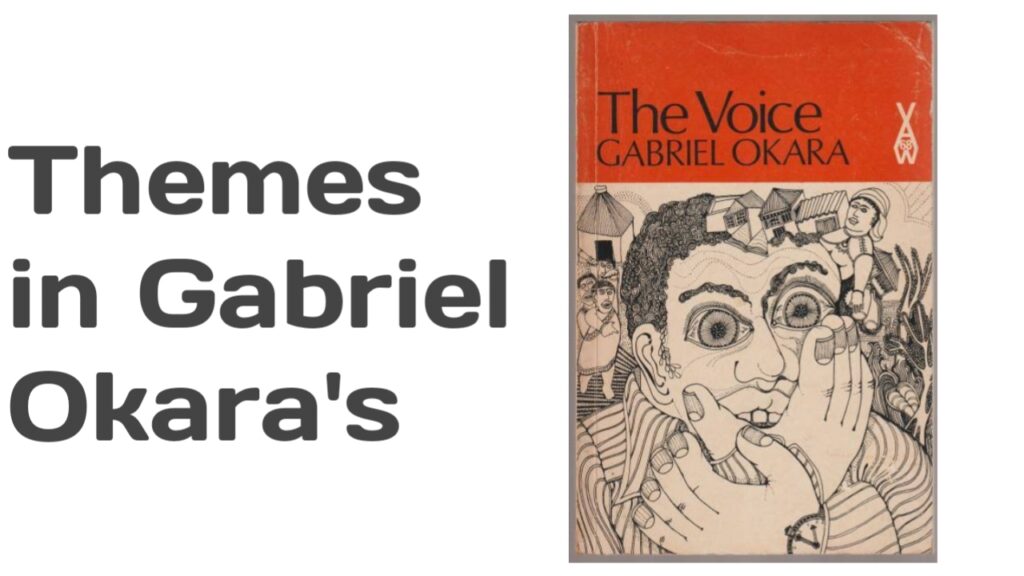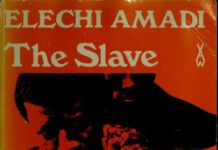Gabriel Okara’s The Voice is replete with a lot of themes. Some of the themes in The Voice are the themes of bribery and corruption, violence and social oppression, and disillusionment.
Theme of Bribery and Corruption
The theme of bribery and corruption is one of the major themes in The Voice. Corruption is simultaneously everywhere; it is encountered in almost every small or big sector of society.
Corruption is defined as the dishonest or fraudulent conduct by those in power, typically involving bribery. It is the illegitimate use of power to benefit a private interest. In fact, corruption makes the rich richer and the poor poorer. Those who possess power make use of it for their personal benefits as well as to hide the truth and mislead the realities.
Corruption remains to be a major social, political and economic challenge against which African countries in general and Nigeria in particular continue to fight. It spreads where there is no discipline or strong moral principles that may keep it in check. Corruption exists in various forms: political and social, as it is manifested either by bribing or embezzling.
The Voice embodies full illustrations of corruption, failing economic and social systems in a fictional setting that draws resemblance to Nigeria.
Gabriel Okara gave equal importance concerning the phenomenon of bribery as being the main reason behind the corrupt state. Okara uses Chief Izongo as the primary symbol of bribery and corruption.
In The Voice, bribery and corruption spread almost everywhere in Amatu and Sologa as Okara depicted it in his novel. The daily life and commercial activities are becoming more suspicious and fake.
Chief Izongo had put a reward on the head of Okolo and anyone who catches him, will be rewarded. In chapter eight, there is a reference to this kind of unethical behaviour where a mother “asks her son to go catch Okolo, one of the main resistant figures, so as to denounce him and be rewarded. Her son replies that nothing can be done in Sologa freely.” The son scratches his head. ‟I have no money to find him,” he said quietly. “Money? You will take money to find him?” His mother asked not believing. “Without money, I can’t find him. Money is inside everything in Sologa.” This is a kind of pure assertion about the role which bribery holds in the society as a means of resolving problems.
In The Voice, bribery and corruption contaminate even the field of justice and fairness. Everyone is involved under this unethical act despite their social status, starting from the Prime Minister, Chief Izongo to the policemen down to the simple ordinary citizen from Amatu or Sologa.
Okara in this novel referred to a policeman who confesses to Okolo that bribery is one of the means through which one can be rich easily: this man’s spoken words stirred Okolo’s inside. In his inside he stirred them and looked. This man had said he had taken home bags of money and was now returning to Sologa. He was a policeman and to him on earth, it was the best work, especially if one has a lucky head.
If you have a lucky head and if you catch a rich trader stealing from a big Whiteman’s shop then on heap of money you stand up to your knees.
The Voice.
Theme of Violence and Social Oppression
The theme of violence and social oppression is one of the prominent themes in The Voice. The novel displays the dramatic role that violence and social oppression play within the corrupt ruling system.
In fact, the use of force, intimidation, destruction, pain and suffering was the only way for Chief Izongo to maintain his position in the community and avoid any opposition and rebellion against his rule.
A great attention is given to the phenomenon of social oppression and violence in the text. Warnings and fear were no longer enough to stop the resistance against the ruling system. Chief Izongo failed in his mission to bring Okolo to his side by soft and kind words. Therefore, he saw the necessity of using violence to erase the root of the conflict and opposition.
Chief Izongo and his followers did not have any tolerance or sympathy for Okolo or anyone else who opposes the ruling system.
The abuse of power was very notable in the novel. When it comes to the matter of criticising the system, everyone who is suspected must be arrested and held. Okolo himself has been harmed and mistreated by Izongo’s messengers and the people of Amatu who support the system:
The people snapped at him like hungry dogs snapping at bones. They carried him in silence like silence of ants carrying a crumb of yam or fish bone. Then they put him down and dragged him past thatch houses that in the dark looked like pigs with their snouts in the ground, pushed and dragged him past mud walls pitying eyes, pushed and dragged him past concrete walls with concrete eyes; pushed and dragged him along the waterside like soldier ants with their prisoner.
Pp. 38–39, Gabriel Okara’s The Voice.

The theme of violence is also strongly reflected in Okara’s The Voice. Indeed, Chief Izongo fails in his mission in bribing Okolo, thus, leaving him with no choice but to use violence and oppression. Thus, Chief Izongo set to destroy Okolo’s image by attributing madness to him; describing him as a mad person to ensure his words will have no value and will never be taken seriously.
From the very first line of the first page of the novel, Okolo is depicted almost as an abnormal person:
So the town of Amatu talked and whispered; so, the world talked and whispered. Okolo had no chest, they said. His chest was not strong and he had no shadow. Everything in this world that spoiled a man’s name they said of him.
p. 23, The Voice .
Okara stressed on the overused social oppression to demoralise opponents of the current system. One of the means of social oppression used by those in power is to demoralise their political opponents.
In The Voice, Okolo found himself banished from his village because Chief Izongo sees him as a threat to his position of power, as he shows off in front of his people proclaiming:
It was a great task I performed, my people. A great task in sending him away. A dangerous task, but it had to be done for the good of us all.
p. 72, The Voice.
Okara focuses on portraying the pre-dominance of violence and social oppression within the Nigerian system of government.
Theme of Disillusionment
The theme of disillusionment is one of the significant themes projected in Gabriel Okara’s The Voice. Corruption and disillusionment are interrelated, in a way that wherever there is corruption, the persons that submit to it or live under its conditions are ultimately submerged by a feeling of disillusionment despair and disappointment.
Okara’s The Voice satirises the historical path of Nigeria after independence and brought certain realities like political and social issues through their literary style which brings reality alive through fiction.
Disillusionment is a central theme in The Voice, as it exhales the prevalent disillusionment that resides in every postcolonial Nigerian spirit.
The Voice is an iconic representation of post-colonial disillusionment. Consequently, the novel excessively reflects Okara’s intense feeling of disillusionment concerning his motherland which after independence turned out in total chaos. A chaos caused mainly by corruption, greed and the quest for power and money which sank the people into a deep feeling of disillusionment, despair and disappointment. It is evident, that disillusionment is the bitter result of the failure in leadership.
Chief Izongo is conceived as the primary symbol of disillusionment, for his corrupt, greedy and selfish way of rule. In fact, people had placed hope and faith in them, however, they have only retrieved deception and disillusionment because Izongo breaks away from his promises of achieving justice, peace, harmony and better social conditions, which turned out to be achieving his personal advancement, progress and benefits.
For greedy and selfish leaders like Izongo, politics has another goal rather than the nation’s welfare. For him, politics is an easy way for personal prosperity mainly through bribery and embezzlement of public funds.
Furthermore, Okara speaks through his characters to demonstrate the passivity, obedience and hypocrisy that characterised the post independent Nigerian society. Okara in his novel strengthens the way in which his characters were fed up of the acts of their leader, but still remain passive and incapable of doing anything to inverse the situation.
Ukule, in one of his claims, denies even the existence of manhood within his society. For him, manhood can only be reached once men die:
If in this world we can recreate ourselves, I would become a man. When I die, I will return as a man, I will continue to be a man but not a cripple.
p. 115, The Voice.
Adding to this, Tebowei declares to Okolo: “These happening things make my inside bitter, perhaps more bitter than yours, but there is nothing I alone or you and I can do to change their insides” (p. 48).
Indeed, one of the messengers asserts:
If the world turns this way, I take it; if it turns another way, I take it. Any way the world turns I take it with my hands. I like sleeping with my wife and my one son, so I do not think.
p. 25, The Voice.
People are aware of the corruption and manipulation that devastated their society but choose hypocrisy and passivity as the only way to protect themselves and the ones they cherish.
Finally, Tuere, a female character who stands with Okolo, sides and shares the same view about the corrupt ruling system. Unlike many male characters, she was not afraid to denounce openly her opposition towards Izongo’s action. This, notwithstanding, like almost all the characters, she is submerged by the feeling of disillusionment as she solemnly declares:
Amatu is lost, yes Amatu is lost.
p. 114, The Voice.
The novel is filled with concrete illustrations that refer to passivity, obedience and disillusionment in both words and actions among the characters. The repressive attitudes of the leaders killed all the sense of dialogue and transparency.
Actually, people in Amatu have some kind of awareness about the selfish and corrupt leaders. However, they remain passive and incapable of doing anything to ameliorate their everyday lives. In this respect, Okara repeatedly depicted his narrators in moments of regret, paralysis and despair, where they were unable to make their voice heard.
We conclude by deducing an important feature related to post independent Nigeria that is called disillusionment of the masses. This malcontent feeling comes as the result of the multi-challenges that face the state at a moment where the political authorities fail to establish order and ensure appropriate environment for its people.
Thereby, Okara’s The Voice ultimately exemplifies disillusionment of the masses through the narrator, their characters and mainly through the entire narrative.
Further Reading:
- Analysis of Gabriel Okara’s “The Voice”
- Characters in Gabriel Okara’s “The Voice”
- Chapter by Chapter Summary of Gabriel Okara’s “The Voice”
 WHATSAPP: Click HERE to join the new Literature PADI WhatsApp group to receive latest updates on your phone and for further literary discussions!
WHATSAPP: Click HERE to join the new Literature PADI WhatsApp group to receive latest updates on your phone and for further literary discussions!









